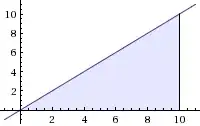In simple terms, a summation is the calculation of the sum of discrete values. Consider this example:
$\displaystyle\sum\limits_{i=0}^{10} i = 0 + 1 + 2 + 3 + 4 + 5 + 6 + 7 + 8 + 9 + 10 = 55$
Integration is the sum of an infinite number infinitely small values. So, I could not rewite an integration problem as the sum of some numbers, like this:
$\int_0^{10} \! x\, \mathrm{d} x, = n + n + ... + n$
Integration is the sum of some numbers, but the $n$ values here cannot be listed because they are infinitely small and non-discrete. It's far more of an abstract concept.
Instead, I think of integration as the area under the graph of the function.

You probably read about Riemann sums, which really highlights the difference between integration and a regular summation.

